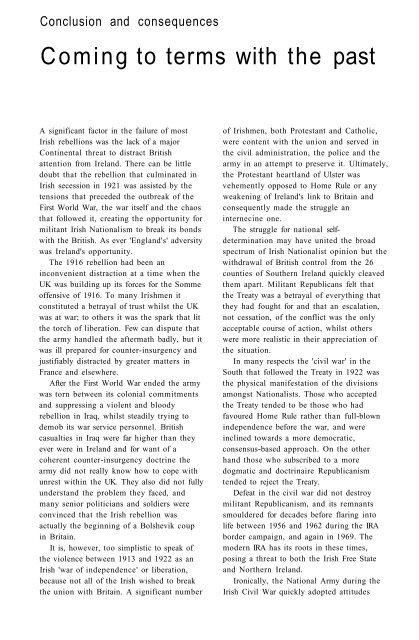You also want an ePaper? Increase the reach of your titles
YUMPU automatically turns print PDFs into web optimized ePapers that Google loves.
Conclusion and consequences<br />
Coming to terms with the past<br />
A significant factor in the failure of most<br />
<strong>Irish</strong> rebellions was the lack of a major<br />
Continental threat to distract British<br />
attention from Ireland. <strong>The</strong>re can be little<br />
doubt that the rebellion that culminated in<br />
<strong>Irish</strong> secession in 1921 was assisted by the<br />
tensions that preceded the outbreak of the<br />
First World <strong>War</strong>, the war itself and the chaos<br />
that followed it, creating the opportunity for<br />
militant <strong>Irish</strong> Nationalism to break its bonds<br />
with the British. As ever 'England's' adversity<br />
was Ireland's opportunity.<br />
<strong>The</strong> 1916 rebellion had been an<br />
inconvenient distraction at a time when the<br />
UK was building up its forces for the Somme<br />
offensive of 1916. To many <strong>Irish</strong>men it<br />
constituted a betrayal of trust whilst the UK<br />
was at war; to others it was the spark that lit<br />
the torch of liberation. Few can dispute that<br />
the army handled the aftermath badly, but it<br />
was ill prepared for counter-insurgency and<br />
justifiably distracted by greater matters in<br />
France and elsewhere.<br />
After the First World <strong>War</strong> ended the army<br />
was torn between its colonial commitments<br />
and suppressing a violent and bloody<br />
rebellion in Iraq, whilst steadily trying to<br />
demob its war service personnel. British<br />
casualties in Iraq were far higher than they<br />
ever were in Ireland and for want of a<br />
coherent counter-insurgency doctrine the<br />
army did not really know how to cope with<br />
unrest within the UK. <strong>The</strong>y also did not fully<br />
understand the problem they faced, and<br />
many senior politicians and soldiers were<br />
convinced that the <strong>Irish</strong> rebellion was<br />
actually the beginning of a Bolshevik coup<br />
in Britain.<br />
It is, however, too simplistic to speak of<br />
the violence between <strong>1913</strong> and <strong>1922</strong> as an<br />
<strong>Irish</strong> 'war of independence' or liberation,<br />
because not all of the <strong>Irish</strong> wished to break<br />
the union with Britain. A significant number<br />
of <strong>Irish</strong>men, both Protestant and Catholic,<br />
were content with the union and served in<br />
the civil administration, the police and the<br />
army in an attempt to preserve it. Ultimately,<br />
the Protestant heartland of Ulster was<br />
vehemently opposed to Home Rule or any<br />
weakening of Ireland's link to Britain and<br />
consequently made the struggle an<br />
internecine one.<br />
<strong>The</strong> struggle for national selfdetermination<br />
may have united the broad<br />
spectrum of <strong>Irish</strong> Nationalist opinion but the<br />
withdrawal of British control from the 26<br />
counties of Southern Ireland quickly cleaved<br />
them apart. Militant Republicans felt that<br />
the Treaty was a betrayal of everything that<br />
they had fought for and that an escalation,<br />
not cessation, of the conflict was the only<br />
acceptable course of action, whilst others<br />
were more realistic in their appreciation of<br />
the situation.<br />
In many respects the 'civil war' in the<br />
South that followed the Treaty in <strong>1922</strong> was<br />
the physical manifestation of the divisions<br />
amongst Nationalists. Those who accepted<br />
the Treaty tended to be those who had<br />
favoured Home Rule rather than full-blown<br />
independence before the war, and were<br />
inclined towards a more democratic,<br />
consensus-based approach. On the other<br />
hand those who subscribed to a more<br />
dogmatic and doctrinaire Republicanism<br />
tended to reject the Treaty.<br />
Defeat in the civil war did not destroy<br />
militant Republicanism, and its remnants<br />
smouldered for decades before flaring into<br />
life between 1956 and 1962 during the IRA<br />
border campaign, and again in 1969. <strong>The</strong><br />
modern IRA has its roots in these times,<br />
posing a threat to both the <strong>Irish</strong> Free State<br />
and Northern Ireland.<br />
Ironically, the National Army during the<br />
<strong>Irish</strong> Civil <strong>War</strong> quickly adopted attitudes



